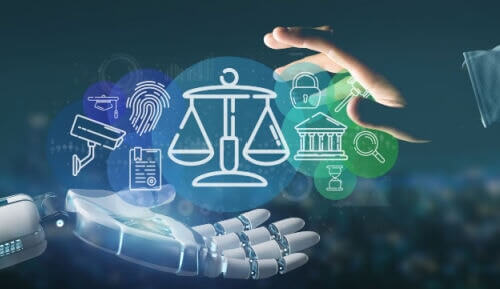
Artificial Intelligence Legal Sector and Careers Impact
Artificial intelligence (AI) is an area of computer science that involves the creation of computer systems to perform tasks that would typically require human intelligence. This includes natural language processing, speech recognition, machine vision, and more. The AI industry has seen significant growth and development in recent years, and there is still much room for expansion.
According to market research firm IDC, worldwide revenues for the artificial intelligence (AI) market grew at 19.6% year over year in 2022 to $432.8 billion. Recent advancements and applications to name a few are
- Natural Language Processing (NLP): NLP is a field of AI that deals with the interaction between computers and human languages. Advances in NLP have led to more accurate speech recognition, language translation, and text generation.
- Computer Vision: Computer vision is a field of AI that deals with the ability of computers to understand and analyze visual information. Recent advancements have improved object detection and facial recognition technologies.
- Reinforcement Learning: Reinforcement Learning is a type of machine learning that focuses on learning through trial and error. Recent advancements have led to improved decision-making and control systems in areas such as gaming and self-driving cars.
- Generative Adversarial Networks (GANs): GANs are a type of neural network that can generate new data samples, such as images or videos. Recent advancements have led to the creation of realistic images and videos that can be used for various applications, such as virtual reality and computer animation.
- Explainable AI: Explainable AI is a field of AI that focuses on creating models that can provide clear explanations for their decision-making processes. This is becoming increasingly important as AI is being used in decision-making processes that affect people's lives.
AI and Diversity
Despite these advances, the AI industry faces a significant challenge in hiring talent, particularly data scientists, who are in high demand but in short supply. All organisations report difficulty in finding the skilled personnel they need to carry out the complex tasks involved in AI research and development.
AI has the potential to automate certain tasks that are currently done by humans, such as data entry and analysis, customer service, and repetitive manual labour. This could lead to job displacement in certain industries. However, AI also has the potential to create new jobs in fields such as data science, machine learning, and AI development. Additionally, AI can improve productivity and efficiency in many industries, leading to growth and new job opportunities. The impact of AI on the job market will depend on how the technology is implemented and how society adapts to it. Policies and investments in education and training can help prepare workers for the changes brought by AI and support a smooth transition.
Different experts have different opinions about AI and how it will impact the job market. Some believe it will take away jobs and others don’t. According to Thomas Davenport and Steven Miller though AI and intelligent technology will take over some jobs, however, that will free up workers to do more challenging and important work.
According to a December 2022 report from McKinsey, when it comes to sourcing AI talent, the most popular strategy among all respondents is reskilling existing employees. The report also points out that AI will help diversity and in turn innovation.
AI and the Legal Sector
AI has found a variety of uses in the legal sector, including automating legal research, generating legal documents, and providing legal information through chatbots. AI-based systems are also being used in legal discovery and document review. However, there are concerns about the impact of AI on employment in the legal sector. The 2023 Report on the State of the Legal Market by Thomson Reuters Institute and the Center on Ethics and the Legal Profession at Georgetown Law predicts a drop in demand for legal services, an uncertain economic outlook, lower profits per partner, fewer billable hours for lawyers, and the potential for firm layoffs.
If we centre our conversation in and around the legal sector and legal market, there can be seen a major impact there too thanks to the augmentation of AI-based technology and its integration in the legal sector. AI has managed to break into one of the most rigid and traditional industries. It has found a variety of uses for itself such as:
- Automating Legal Research: AI-based GPT models can be trained on the legal text and used to generate summaries of legal documents, helping lawyers quickly find relevant information and make more informed decisions.
- Generating Legal Documents: Again, AI-based GPT models can be trained on existing legal documents and used to generate new ones that are similar in style and content. This could be a time-saving tool for lawyers and legal teams, allowing them to quickly generate contracts and other legal documents.
- Legal Chatbots: AI can be used to provide information and answer questions for clients, reducing the need for lawyers to spend time answering routine questions. This allows lawyers to focus on more complex tasks and improves the efficiency of legal services.
- Legal AI: AI-based systems have already begun to be used in legal discovery and document review, helping to quickly identify relevant information, and this trend is set to continue.
The Potential
AI has the potential to transform the job market, both by automating certain tasks and by creating new career opportunities. The impact of AI on employment will depend on how the technology is implemented and how society adapts to it. The legal sector, in particular, is facing challenges as a result of AI, but it is also finding new and innovative uses for the technology.
Also read top viewed Ai Legal article: The Role of AI in Legal Research.






